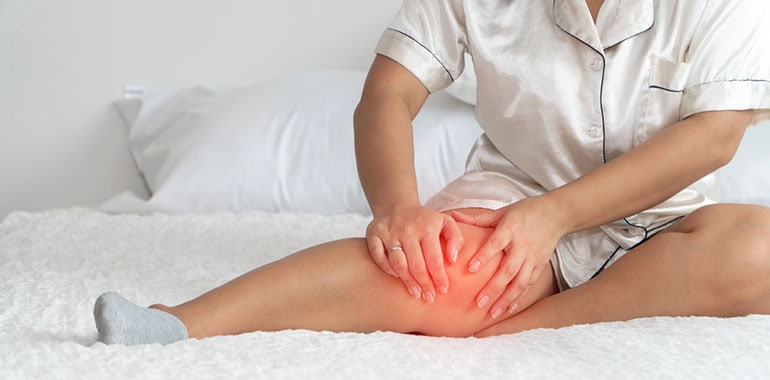Knee pain can range from a dull ache to sharp, intense discomfort, and it may disrupt many aspects of your daily life. This pain may result from an injury, arthritis, or other medical conditions. When knee pain persists, it frequently interferes with sleep. Here is more information about knee discomfort and sleep quality:
Prevents Falling Asleep
Finding a comfortable position to fall asleep may be challenging when you have a painful knee. Lying on your side can aggravate the joint, while lying on your back may not provide sufficient support. Every time you shift to find a more comfortable spot, the movement causes a sharp pain that keeps you awake.
This cycle of pain and restlessness makes drifting off to sleep a frustrating process for many people. The discomfort might lead to a state of heightened awareness, where your mind focuses on the pain instead of relaxing. This mental focus makes it difficult to achieve the calm state needed for sleep.
You may find yourself tossing and turning for hours, unable to settle into a deep rest. Breaking this cycle requires addressing both the physical discomfort and the mental tension it creates. Establishing a soothing bedtime routine and exploring supportive sleep aids, such as body pillows or specialized mattresses, may help provide relief and promote deeper, more restful sleep.
Worsens at Night
Some people notice that their knee pain worsens during the night. Several factors contribute to this experience. During the day, you are active and distracted, which may take your mind off the pain. At night, when the world is quiet and your body is still, the pain becomes more noticeable.
Inflammatory processes in the body sometimes increase at night, which can lead to more swelling and stiffness in the knee joint. Lying still for extended periods may contribute to increased stiffness and discomfort upon waking or shifting positions. This phenomenon means that even if you fall asleep easily, pain may wake you up later.
Affected by Poor Sleep
The relationship between pain and sleep is a two-way street. Just as knee pain disrupts sleep, a lack of quality sleep can exacerbate your pain. Sleep deprivation lowers your pain threshold, meaning you become more sensitive to pain signals. A night of poor rest could leave you feeling more sore and irritable the next day.
Treated Different Ways
Managing knee pain requires a multifaceted approach based on your specific condition. A healthcare provider will evaluate your knee to determine the cause of the pain before recommending a course of action. Various treatment options are available to help manage discomfort. Some standard approaches include:
- Custom orthotics: These are specially designed shoe inserts that help correct alignment issues in your feet and legs, potentially reducing stress on your knees.
- Medications: Over-the-counter or prescription drugs are used to reduce pain and inflammation.
- Injections: Corticosteroid or hyaluronic acid injections directly into the knee joint are options for some individuals to alleviate symptoms.
Other non-surgical treatments may involve physical therapy, casting, or splinting to support and stabilize the knee.
Get Treated for Knee Pain
Addressing the root cause of your discomfort is a positive step toward improving your overall quality of life. A proper diagnosis opens the door to effective treatment strategies designed for your unique situation. If knee pain is keeping you from getting the rest you need, it is time to seek professional guidance. Contact an orthopedic clinic today to schedule an appointment and explore your treatment options.

